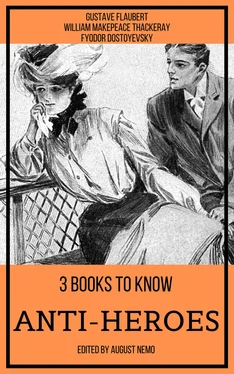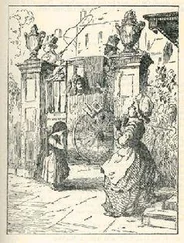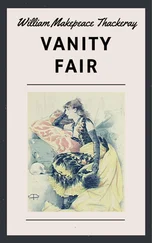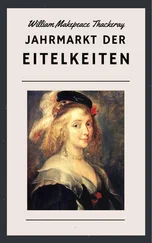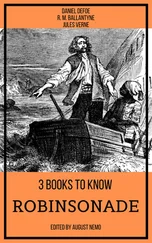Round Hackton village the scene of welcome was particularly gay: a band of music had been brought from Plymouth, and arches and flags had been raised, especially before the attorney’s and the doctor’s houses, who were both in the employ of the family. There were many hundreds of stout people at the great lodge, which, with the park-wall, bounds one side of Hackton Green, and from which, for three miles, goes (or rather went) an avenue of noble elms up to the towers of the old castle. I wished they had been oak when I cut the trees down in ‘79, for they would have fetched three times the money: I know nothing more culpable than the carelessness of ancestors in planting their grounds with timber of small value, when they might just as easily raise oak. Thus I have always said that the Roundhead Lyndon of Hackton, who planted these elms in Charles II.‘s time, cheated me of ten thousand pounds.
For the first few days after our arrival, my time was agreeably spent in receiving the visits of the nobility and gentry who came to pay their respects to the noble new-married couple, and, like Bluebeard’s wife in the fairy tale, in inspecting the treasures, the furniture, and the numerous chambers of the castle. It is a huge old place, built as far back as Henry V.‘s time, besieged and battered by the Cromwellians in the Revolution, and altered and patched up, in an odious old-fashioned taste, by the Roundhead Lyndon, who succeeded to the property at the death of a brother whose principles were excellent and of the true Cavalier sort, but who ruined himself chiefly by drinking, dicing, and a dissolute life, and a little by supporting the King. The castle stands in a fine chase, which was prettily speckled over with deer; and I can’t but own that my pleasure was considerable at first, as I sat in the oak parlour of summer evenings, with the windows open, the gold and silver plate shining in a hundred dazzling colours on the side-boards, a dozen jolly companions round the table, and could look out over the wide green park and the waving woods, and see the sun setting on the lake, and hear the deer calling to one another.
The exterior was, when I first arrived, a quaint composition of all sorts of architecture; of feudal towers, and gable-ends in Queen Bess’s style, and rough-patched walls built up to repair the ravages of the Roundhead cannon: but I need not speak of this at large, having had the place new-faced at a vast expense, under a fashionable architect, and the facade laid out in the latest French-Greek and most classical style. There had been moats, and drawbridges, and outer walls; these I had shaved away into elegant terraces, and handsomely laid out in parterres according to the plans of Monsieur Cornichon, the great Parisian architect, who visited England for the purpose.
After ascending the outer steps, you entered an antique hall of vast dimensions, wainscoted with black carved oak, and ornamented with portraits of our ancestors: from the square beard of Brook Lyndon, the great lawyer in Queen Bess’s time, to the loose stomacher and ringlets of Lady Saccharissa Lyndon, whom Vandyck painted when she was a maid of honour to Queen Henrietta Maria, and down to Sir Charles Lyndon, with his riband as a knight of the Bath; and my Lady, painted by Hudson, in a white satin sack and the family diamonds, as she was presented to the old King George II. These diamonds were very fine: I first had them reset by Boehmer when we appeared before their French Majesties at Versailles; and finally raised L18,000 upon them, after that infernal run of ill luck at ‘Goosetree’s,’ when Jemmy Twitcher (as we called my Lord Sandwich), Carlisle, Charley Fox, and I played hombre for four-and-forty hours SANS DESEMPARER. Bows and pikes, huge stag-heads and hunting implements, and rusty old suits of armour, that may have been worn in the days of Gog and Magog for what I know, formed the other old ornaments of this huge apartment; and were ranged round a fireplace where you might have turned a coach-and-six. This I kept pretty much in its antique condition, but had the old armour eventually turned out and consigned to the lumber-rooms upstairs; replacing it with china monsters, gilded settees from France, and elegant marbles, of which the broken noses and limbs, and ugliness, undeniably proved their antiquity: and which an agent purchased for me at Rome. But such was the taste of the times (and, perhaps, the rascality of my agent), that thirty thousand pounds’ worth of these gems of art only went for three hundred guineas at a subsequent period, when I found it necessary to raise money on my collections.
From this main hall branched off on either side the long series of state-rooms, poorly furnished with high-backed chairs and long queer Venice glasses, when first I came to the property; but afterwards rendered so splendid by me, with the gold damasks of Lyons and the magnificent Gobelin tapestries I won from Richelieu at play. There were thirty-six bedrooms DE MAITRE, of which I only kept three in their antique condition,—the haunted room as it was called, where the murder was done in James II.‘s time, the bed where William slept after landing at Torbay, and Queen Elizabeth’s state-room. All the rest were redecorated by Cornichon in the most elegant taste; not a little to the scandal of some of the steady old country dowagers; for I had pictures of Boucher and Vanloo to decorate the principal apartments, in which the Cupids and Venuses were painted in a manner so natural, that I recollect the old wizened Countess of Frumpington pinning over the curtains of her bed, and sending her daughter, Lady Blanche Whalebone, to sleep with her waiting-woman, rather than allow her to lie in a chamber hung all over with looking-glasses, after the exact fashion of the Queen’s closet at Versailles.
For many of these ornaments I was not so much answerable as Cornichon, whom Lauraguais lent me, and who was the intendant of my buildings during my absence abroad. I had given the man CARTE BLANCHE, and when he fell down and broke his leg, as he was decorating a theatre in the room which had been the old chapel of the castle, the people of the country thought it was a judgment of Heaven upon him. In his rage for improvement the fellow dared anything. Without my orders he cut down an old rookery which was sacred in the country, and had a prophecy regarding it, stating, ‘When the rook-wood shall fall, down goes Hackton Hall.’ The rooks went over and colonised Tiptoff Woods, which lay near us (and be hanged to them!), and Cornichon built a temple to Venus and two lovely fountains on their site. Venuses and Cupids were the rascal’s adoration: he wanted to take down the Gothic screen and place Cupids in our pew there; but old Doctor Huff the rector came out with a large oak stick, and addressed the unlucky architect in Latin, of which he did not comprehend a word, yet made him understand that he would break his bones if he laid a single finger upon the sacred edifice. Cornichon made complaints about the ‘Abbe Huff,’ as he called him. (‘Et quel abbe, grand Dieu!’ added he, quite bewildered, ‘un abbe avec douze enfans’); but I encouraged the Church in this respect, and bade Cornichon exert his talents only in the castle.
There was a magnificent collection of ancient plate, to which I added much of the most splendid modern kind; a cellar which, however well furnished, required continual replenishing, and a kitchen which I reformed altogether. My friend, Jack Wilkes, sent me down a cook from the Mansion House, for the English cookery,—the turtle and venison department: I had a CHEF (who called out the Englishman, by the way, and complained sadly of the GROS COCHON who wanted to meet him with COUPS DE POING) and a couple of AIDES from Paris, and an Italian confectioner, as my OFFICIERS DE BOUCHE. All which natural appendages to a man of fashion, the odious, stingy old Tiptoff, my kinsman and neighbour, affected to view with horror; and he spread through the country a report that I had my victuals cooked by Papists, lived upon frogs, and, he verily believed, fricasseed little children.
Читать дальше
